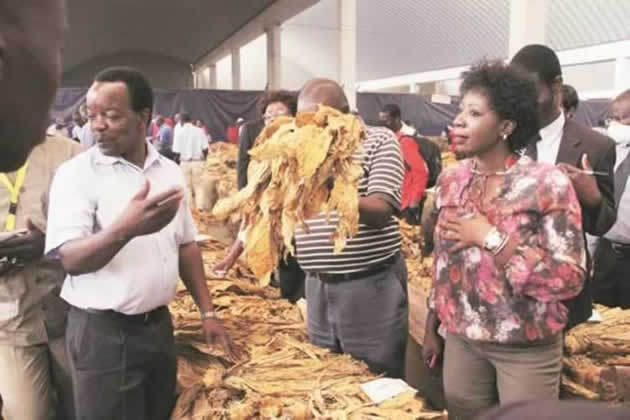‘Financial inclusion will improve productivity’


“We expect tobacco merchants to pay fair prices commensurate with the quality of tobacco which will enable farmers to have sustainable returns on their tobacco, says TIMB chief executive Dr Andrew Matibiri (pictured right above).
The 2016 tobacco selling season opened on Wednesday with farmers expecting firm prices due to the decline in production as a result of the drought. This season has also seen the Reserve Bank of Zimbabwe introducing a new payment method whereby farmers no longer get cash but are paid through their bank accounts. Our Agriculture Reporter, Elita Chikwati (EC) talked to the Tobacco Industry and Marketing Board chief executive Dr Andrew Matibiri (AM) on these and other issues relating to the tobacco season
EC: How has the 2016 tobacco marketing season started compared to the previous seasons?
AM: The 2016 season was delayed and we expect less volumes of tobacco compared to 2015. There are, however, high expectations in terms of good quality which is a positive.
EC: The season was characterised by late and intermittent rains and prolonged dry spells, how did this affect the crop?
AM: The El Nino weather system resulted in a late season. Climate change continues to threaten agriculture, hence our major thrust has been to put in place the necessary measures to mitigate the effects of climate change. We are adjusting and adapting to the erratic weather pattern through good agronomic practices that reduce exposure to the harsh climatic conditions.
EC: What has TIMB done to assist farmers especially in dry conditions?
AM: TIMB and Agribank established a revolving fund for the development and installation of drip irrigation for small-scale growers. Interested tobacco growers can make enquiries at any TIMB offices in Mvurwi, Marondera, Karoi, Rusape, Bindura, Harare or at Agritex offices.
EC: Climate change has affected crop production in most countries. What have you as TIMB done to ensure farmers continue to produce tobacco even under harsh weather conditions and still get meaningful yields?
AM: TIMB is working with the Tobacco REsearch Board (TRB) to develop drought-resistant varieties. TIMB also has drip irrigation schemes for small-scale farmers. We are promoting water conservation techniques such as minimum tillage, use of crop covers and use of organic matter. Government is complementing these efforts by rolling out irrigation facilities.
EC: What is the general quality of tobacco this season and do you see the crop fetching favourable prices?
AM: TIMB has been training farmers on good agronomic practices to improve the chemical and physical integrity of tobacco. We hope this will translate to good prices. We expect tobacco merchants to pay fair prices commensurate with the quality of tobacco which will enable farmers to have sustainable returns on their tobacco. We will not allow tobacco merchants to collude and offer lower prices to farmers.
EC: TIMB introduced the e-marketing system. Can you explain how the system will work and how it will improve marketing of the crop?
AM: With the e-marketing system, the starter and the buyers gather around the tobacco bale to start the auction sale process. The starter starts the bidding process by entering the starting price for the tobacco bale. The computer system broadcasts the auction start price and the bale details to the Hand-Held Terminals (HHT) of all the buyers currently logged in.
The buyers then start placing bids through their HHTs. The bids are transmitted to the TIMB server. This process continues until a bid is placed and no further bids enter the system for a pre-defined duration of time. The TIMB server then evaluates the bids and determines the highest bid.
If two or more buyers submit bids that are equal and also the highest, the sale is awarded to the one who submitted the bid first. The TIMB computer system then marks the last highest bid placed as the winning bid and informs all the buyers of the end of the sale of that particular bale of tobacco without details of the buyer who won the sale. The buyer who placed the winning bid is informed (on his device and on the computer at his offices) separately about his successful bid. The auction for the bale is then closed and the bale is marked as sold in the TIMB server database. This system will be introduced into the season and will run concurrently with the current one to start with.
EC: What are the benefits of this electronic system?
AM: The benefits of the electronic auctioning of tobacco include the reduction in terms of the processing time for grower payments. It will eliminate illicit floor activities such as ticket tampering. It will also ensure that the buying process will be as transparent as possible and there is no conniving amongst buyers.
Tobacco buyers will receive real-time data as the auction process happens and will therefore be able to tally bales when they reach the dispatch section of the sales floor. With a TIMB system monitoring the sale process it makes the whole process more transparent and there won’t be any manipulation of data.
EC: The Reserve Bank of Zimbabwe has introduced a new payment system for farmers who now will get their money through their bank accounts. How will farmers open accounts and what are the charges for the farmer to maintain the account?
AM: A farmer only needs to furnish the bank with his or her identity document and their growers number in order to open a bank account. Banks are offering accounts to tobacco growers at favourable conditions which include waiving of charges for maintaining bank accounts. This move will protect farmers from unscrupulous dealers and traders who have in the previous seasons flooded the floors and fleeced tobacco farmers of their earnings.
EC: How have farmers responded to the new payment system so far?
AM: Farmers have generally welcomed this development although some were initially sceptical. Farmers will enjoy the convenience of transacting through payment platforms such as mobile banking and points of sale (POS). The use of the banking system by the farmers will go far in creating a track record which will in the future become handy when farmers approach banks seeking financial assistance for the production of tobacco. Financial inclusion will improve growers’ quality of life, improve farmers’ access to financial services as well as improve farm productivity in terms of increased average revenue for the grower as well as yield per hectare.
EC: Since last season, farmers have been contributing the tobacco levy? I understand $7 million was raised through the levy. Can you explain how the fund will be disbursed and how it will assist farmers?
AM: Details of exactly how the programme will be implemented will be availed in due course once the proposal is approved. There may be one or two changes to the proposal hence I would not want to mislead you by giving you details of something that is not yet final.
EC: When are farmers likely to start benefiting from the fund?
AM: We expect the planting of gum trees to commence around June July. We have written to Treasury our proposal for how we seek to have the afforestation programme implemented. We have assurance from Treasury that they will support the afforestation programme.
EC: The tobacco levy has been reduced from 1,5 percent to 0,75 percent of the sales. Can you explain what necessitated the reduction in the charges?
AM: The adverse effects of the El-Nino necessitated reduction in the levy. The aim is to improve viability of the farmers.
EC: Some farmers are complaining over low prices being offered by buyers while buyers attribute the low prices to poor quality. What are the attributes of a good tobacco crop?
AM: A good crop is determined by its physical and chemical attributes. The nicotine content, the aroma, the plant position, how it was cured, the grading and the presentation will affect the price of tobacco. Farmers need to manage cost and to increase production so as to improve returns per hectare.
EC: What have you as the board done to help farmers meet the market requirements?
AM: To improve production efficiencies, growers should be trained in modern cultivation methods. TIMB and Farmers Development Trust (FDT) have been continuously been training growers at the FDT training centres over the past three years. The training is structured in a modular format covering all aspects of tobacco production. Tobacco farming is a business and farmers need to avail themselves for this programme or other initiatives aimed at imparting good agronomic practices.
EC: Tobacco production has been on the increase for the past years due to the favourable prices. What are you doing as TIMB to ensure tobacco production is sustainable and does not lead to environmental degradation?
AM: We have trained farmers on sustainable tobacco production. We have promoted the use of energy-efficient curing methods. We have been constructing the rocket barns for farmers under a revolving fund. The afforestation levy is aimed at ensuring that tobacco is sustainably produced in Zimbabwe.
EC: Tobacco production has been blamed for the decline in production of food crops especially maize. What is your comment on that?
AM: Tobacco growers are also maize farmers and maize can be grown in rotation with tobacco. Tobacco production improves food security as income from tobacco is invested for other crop production. Tobacco is produced on sandy soils not suitable for cereal production. It is important to note that tobacco is grown on only 3 percent of total arable land in Zimbabwe.
EC: What are the challenges being faced in the tobacco sector and how do you think they can be overcome?
AM: Shortage of capital which is as a result of liquidity crunch is one challenge facing the industry. Inputs are also overpriced. Farmers experienced inconsistent supply of electrical energy during the season. We urge tobacco growers to work hard, use their proceeds wisely and improve their lifestyles and livelihoods.








Comments